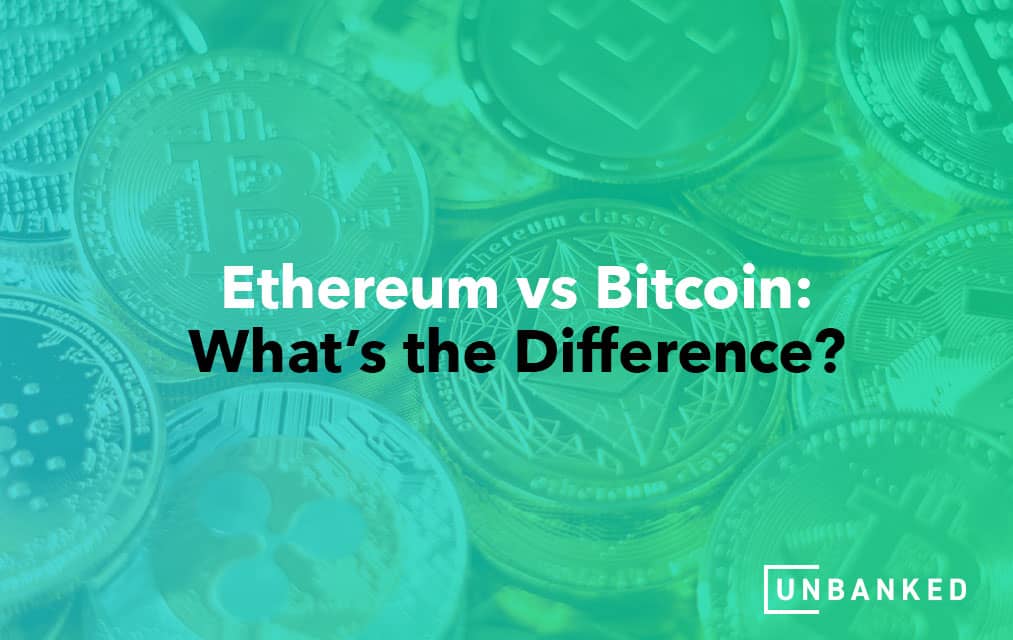In the world of investments, there are countless options for people to choose when selecting assets to include in their portfolios. From mutual funds and stocks to real estate and exchange-traded funds, there is essentially no limit when it comes to the investment options people have available to them. For more than a decade now, these options have only increased with the creation of new cryptocurrencies in the investment world. Since the founding of Bitcoin back in 2009, more than 5,000 different cryptocurrencies have been developed and launched, providing savvy investors with a vast new range of valuable investment opportunities.
But out of all of these different cryptocurrencies, which is the best investment for your portfolio? This article intends to explore the differences between two of the top crypto in the market, Bitcoin and Ethereum, to help you determine the best investment opportunity for you. And if you’d like to learn even more about top-quality investment opportunities and other ways to take better control over your financial future, check out the range of expertly written resources and superior services proudly offered by the industry experts at Unbanked today.
Related: What is DeFi in Cryptocurrency?
The Basics of Bitcoin
Bitcoin (BTC)was launched back at the beginning of 2009 to serve as an online-based currency that isn’t secured by any central authority. There are no physical cryptocurrencies (don’t let the pictures of crypto “coins” fool you), only balances associated with crypto secured on a public ledger. While Bitcoin was not the first type of online currency, it is primarily considered the predecessor of almost all other cryptocurrencies currently on the market due to its extraordinary and rapid success. As of September 24th, 2021, Bitcoin has a circulating supply of approximately 18.8 million Bitcoins and a market cap of about $796.2 billion, with each Bitcoin valued at slightly more than $44,000.00. This value is about 32% lower than Bitcoin’s all-time high value of nearly $65,000.00 per coin.

Bitcoin Pros and Cons
Bitcoin provides a range of pros and cons that investors should carefully consider before choosing to put their hard-earned money towards this particular cryptocurrency and add it to their portfolio.
Pros
The most significant advantage of Bitcoin is that it is one of the oldest and most recognized cryptocurrencies available on the market due to its long track record of financial success. These factors have served to make it the most popular and widely accepted type of crypto that many would be delighted to include in their investment portfolio. Another significant advantage of Bitcoin is its limited supply since there will only ever be 21 million tokens available within the market. This scarcity has helped to drive up its value in the eyes of crypto-investors, who generally consider Bitcoin to be “digital gold.” Bitcoin’s history of increasing value could help hedge against the effects of inflation.
Cons
Despite Bitcoin’s massive success and popularity within the crypto and investment worlds, choosing to invest in it is still risky, as it is with any cryptocurrency. No one truly knows whether or not crypto will ever become mainstream for currency- though it does seem to be headed in that direction- and that uncertainty carries a certain amount of risk that investors need to consider carefully. Additionally, the massive cost of Bitcoin is an enormous barrier for many investors wanting to get in on the game. It’s become almost impossible for people to purchase bitcoin due to its immense value, and it leaves people having to rely on other methods, such as crypto mining. However, crypto mining is often an intense and complicated process that typically requires expensive, high-powered equipment that utilizes massive amounts of electricity.
Related: Best Crypto Tax Tools You Need to Know of
The Basics of Ethereum
Ether (ETH), the crypto of the Ethereum network, is widely considered the second most popular form of cryptocurrency after Bitcoin. Launched back in mid-2015, Ethereum has become the largest and most well-established decentralized, open-ended software platform within the crypto industry. It possesses its own programming language running on a blockchain system that enables developers to program secure decentralized applications and smart contracts. Ether is used for two primary purposes; to operate as a digital currency on a range of crypto exchanges just like other forms of cryptocurrency and to essentially serve as a source of “fuel” for running various commands and applications on the Ethereum network. As of September 24th, 2021, Ethereum has a circulating supply of approximately $117.7 million Ether and a market cap of about $343 billion, with each Ether coin being valued at $2,929.34.
Ethereum Pros and Cons
Like Bitcoin and all other forms of cryptocurrency available on the market, Ethereum provides investors with a range of positives and negatives that should be carefully considered before adding the crypto asset into an investment portfolio.
Pros
One of the most significant advantages of Ethereum is that it is much more versatile than Bitcoin. Not only does Ethereum possess a native crypto token that can be traded on exchanges, but its specialized blockchain also serves as a platform for the creation and execution of decentralized applications and customized smart contracts. Because Ethereum is an example of open-source technology, any developer can create a seemingly endless amount of new applications. However, the most common types involve non-fungible tokens (NFTs) and decentralized finance (DeFi). Another benefit of Ethereum is that it is much less energy-intensive than Bitcoin and can process transactions much more quickly.
Cons
Despite Ethereum’s wide range of benefits and market potential, it is still not as popular as Bitcoin or widely accepted among merchants, putting it at a relatively significant disadvantage. Additionally, developers are currently in the process of growing and changing Ethereum from a proof-of-work (PoW) network to a proof-of-stake (PoS) network, which has the potential to result in greater levels of volatility within the market. While this may not pose a significant issue for everyone, many investors want to avoid risky or volatile investments. There is also the fact that PoS protocols have some significant drawbacks since it provides miners with the most Ethereum tokens with the most power when it comes to the verification of transactions. This factor creates the possibility that a small number of individuals could possess majority control over the entire Ethereum blockchain.
Do you need more information about all of the capabilities of cryptocurrency and the role it could play in improving your future financial prospects? Check out the vast array of expertly written educational resources offered by the professionals at Unbanked today to find out more.
Key Differences Investors Need to Understand
While Bitcoin and Ethereum may seem relatively similar at first glance since they are both digital currencies traded through online exchanges, they feature a massive range of technical differences. The primary difference that should be noted between the two is that Bitcoin only functions as a cryptocurrency, while Ethereum is a ledger technology that developers can utilize to create new and unique programs. So, while both Bitcoin and Ethereum operate on blockchain technology, Ethereum offers a much more comprehensive range of uses for developers, investors, and others. Additionally, it needs to be noted that the Bitcoin and Ethereum networks have very different goals. Bitcoin was specifically created to be an alternative to national currencies and provide a way for people to anonymously transfer value between each other without the involvement of a central bank or other third-party mediators. Ethereum, however, was developed to be a platform able to facilitate the creation of specialized applications and contracts through its own Ether cryptocurrency.
It should also be noted that Ethereum is an example of a blockchain that supports and complements the Bitcoin network, meaning that it shouldn’t actually be in competition with Bitcoin at all. It’s only the relative popularity of each that has pushed Ether to compete with Bitcoin along with all other cryptocurrencies available on the market. However, while Ethereum has been close behind Bitcoin in terms of its ranking since its launch in 2015, the Ether ecosystem (worth just under $16 billion) is still nearly ten times smaller than that of Bitcoin (worth more than $147 billion).
Related: How to Buy Penny Cryptocurrencies

Bitcoin or Ethereum: Which Investment is Right For You?
When it comes to determining which type of cryptocurrencies would be the most beneficial to include in an investor’s portfolio, the essential factors they will need to consider primarily revolve around their overall tolerance for risk and volatility. Both Bitcoin and Ethereum have performed very well since their initial creation and are predicted to continue performing well in the future as the world becomes ever more reliant on the digital world and the acceptance of cryptocurrency expands. However, it’s still essential for investors to keep in mind that they both come with their own levels of risk that many investors may not want to deal with.
Bitcoin is the more stable of the two cryptocurrencies due to its mainstream popularity, making it much more attractive for investors who are averse to taking on more significant risks. However, the bullish sentiments among crypto-industry experts have grown more in favor of Ethereum over the past year. Additionally, the higher risks that come with Ethereum investments can result in significantly higher rewards for investors, as most higher-risk investments do.
All that said, most cryptocurrency and crypto-investment experts have said that both Bitcoin and Ethereum are solid options for investors who are just starting in the crypto game. Additionally, many other experts have also noted the benefits of investing in both cryptocurrencies at once. Investors don’t have to choose between one cryptocurrency or the other, after all, so it can be very advantageous for people to include both forms of crypto in their portfolios. It’s generally agreed that investors should dedicate only about 5% or less of their portfolio to cryptocurrency, and only if crypto investments won’t get in the way of other financial essentials, like paying off debt or putting together an emergency savings fund.
How one decides to split your money between these two investments depends on an investor’s personal preferences. Though a 60/40 or 50/50 split between Bitcoin and Ethereum is usually recommended by industry experts. Additionally, investors can choose to utilize a weighted market cap strategy and focus solely on the total market value for each crypto they would like to include in their portfolio. For example, if an investor wanted to put $100 towards Ethereum and Bitcoin investments, $71 would be put towards Bitcoin, and $29 would be put towards Ethereum based on their current market caps. This weighted market cap strategy can be advantageous for investors who may want to further diversify their portfolio by investing in other forms of cryptocurrency in the future.
Final Thoughts and Considerations to Keep in Mind
Investing in any form of cryptocurrency comes with a range of volatility and risk factors that investors should understand thoroughly before handing over their money. However, they also possess a wide range of potential benefits. Investors need to carefully consider whether the potential rewards are worth the risks that come with crypto investments. They should also understand that they are not limited to selecting only a single crypto investment for their portfolio. Not only is it reasonable to invest in multiple forms of crypto, but many experts have also indicated that doing so may be a safer way to approach crypto investments as a whole. If you’d like more information on the wonderful world of cryptocurrency and other investment opportunities, please consider checking out the range of quality resources and services presented by the industry experts at Unbanked.
Would you like to discover even more information about the growing strength of cryptocurrency and its potential to help you take control over the future of your investments and finances? Check out the range of stellar resources provided by the industry experts at Unbanked today.





